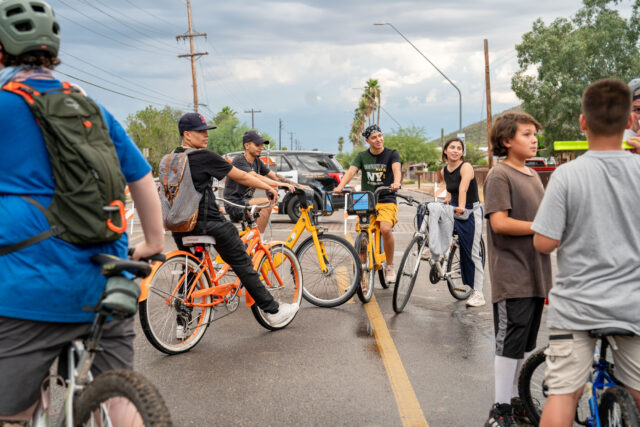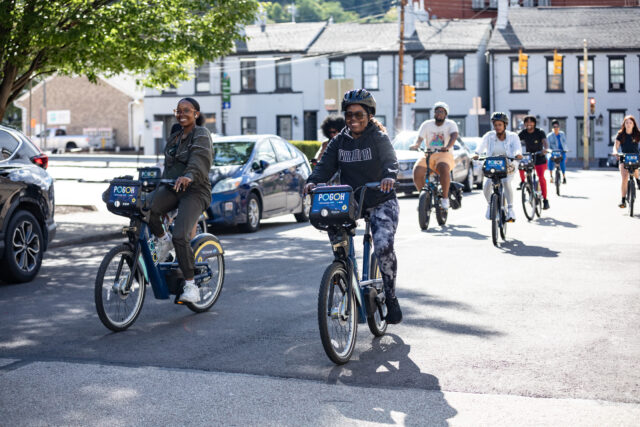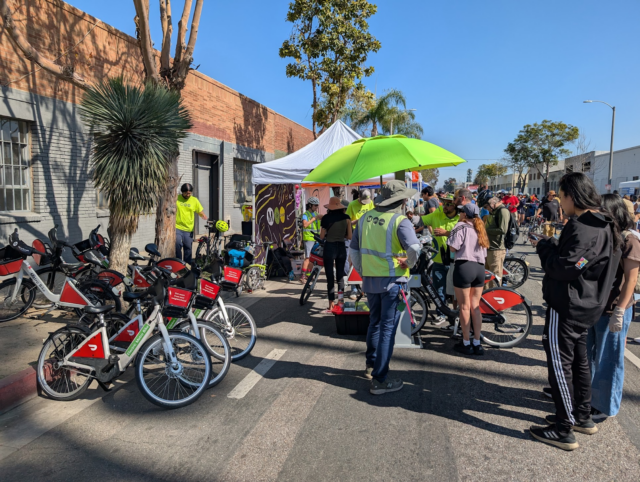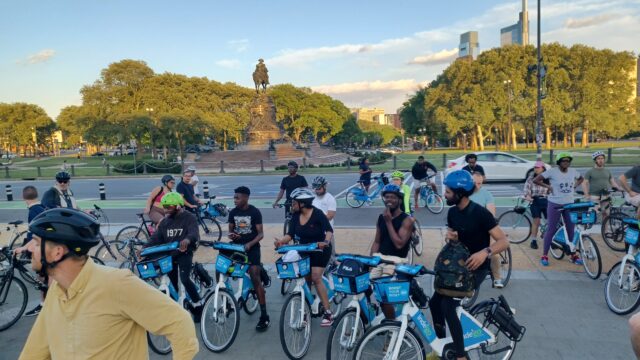Reimagining Shared Micromobility: The Latest From Our Living Labs
by Odochi Akwani, Writer and Content Manager
April 10, 2025
Tucson, Pittsburgh, Los Angeles, and Philadelphia are all expanding bike share access and equity in their first year as BBSP Living Labs.
From expanding access in historically underserved neighborhoods to rethinking how bike share systems engage their communities, our cohort of Living Labs is taking an innovative approach to making bike share more inclusive and reflective of local needs as they expand. Hear how each project is shaping up below.
TUGO PARA NUESTROS BARRIOS — Tucson, AZ

An evening block party with FUGA Tucson on the westside with a community ride starting and ending at the block party that Tugo Bike Share supported
Tugo Bike Share is working on a community-led planning effort to reallocate its services to serve the south and west sides of Tucson more equitably.
“Our bike share system has been around since 2017,” says Benjamin Elias, project manager at the City of Tucson, Transportation and Mobility. “We’ve had some time to settle into how that system works in Tucson, but it’s also really kind of the time to challenge our past assumptions of what can work and who we’re really serving with bike share in Tucson.”
According to Elias, Tugo initially assumed that its strong relationships with partners and community-based organizations would make executing their Living Lab plan straightforward. However, over the past year, he has witnessed firsthand how barriers can arise when cities or other governmental entities work in a grassroots, community-led way.
“We know procurement can sometimes make it slower and more cumbersome to pay community-based organizations for the work,” says Elias. “Often it’s work that they’re already doing in some fashion, but we’re trying to plug them in and build capacity so they can do more of what they do already.”
Currently, Tugo is working with its Office of Equity and data team to finish an analysis of how its system is working now to propose locations that would make sense to reallocate stations and bikes to.
“We ultimately want to take 10% [of stations], thereabouts, and reallocate them,” says Elias. “One of the things that’s perpetuated, kind of this ‘maintaining the status quo’ in our system, is that the vast majority of our system is all based in Ward Six, which is our Central Council District. We’re nowhere close to approaching an equal distribution in the wards — it’s just a very inequitable setup. 10% doesn’t seem like that much, but I think that will start to create some shift in the way that we’ve thought about who our system is serving.”
EQUITABLE OUTREACH AND ENGAGEMENT IN PITTSBURGH — Pittsburgh, PA

POGOH’s final group ride of 2024
In Pittsburgh, POGOH’s Living Lab looks to address low ridership across the POGOH bike share system and a lack of awareness of the system in the Homewood neighborhood. Homewood is located on the east side of Pittsburgh and is a predominantly Black neighborhood. POGOH aims to engage young people and their families through their project. POGOH brings the nonprofit bike share operator perspective to the cohort.
“Having the cohort that we have, it’s so eclectic from different cities, different operators, different structures, and us being the nonprofit that owns and operates the bike share program, it’s nice to get different perspectives”, says Erin Potts, director of marketing and community outreach at POGOH. “I think it’s healthy to know how other structures work, both for benefit and for some barriers. But it’s been really interesting to be able to talk with those folks from so many different places and different systems.”
POGOH had to pivot its strategy in the last few months due to new insurance requirements launched towards the end of last year, creating some unexpected new hurdles.
“We were dropped from our former insurance provider that allowed us to rent bikes for people 14 years and over, and that was something we’d worked for years to bring it down from 16 to 14,” says Potts. “Then all of a sudden, our carrier switched, the terms switched, and now you have to be 18 years or older to ride a POGOH bike in Pittsburgh, and that’s really disappointing for us from an equity standpoint.”
With the new barrier, POGOH had to adjust how they engage with youth in Homewood. Thanks to the help of current Transportation Justice Fellow Brother Llloyd Chetaom, equity initiative manager of POGOH, they found an avenue to work with the same partners and engage youth in bike share differently through a senior project. Additionally, POGOH is broadening its scope to be more about infrastructure around schools in Homewood and having students lead the conversation about what they want to see in their community regarding making it bike- and pedestrian-friendly.
COMMUNITY-LED COALITION FOR EQUITABLE IN-FILL AND EXPANSION OF METRO BIKE SHARE — Los Angeles, CA

First CicLAvia of 2025
As Metro Bike Share in LA expands its network from downtown to the west, the Los Angeles Living Lab Coalition, consisting of Metro Bike Share, Bike LA, LA Walks, Walk ‘n Rollers, and CicLAvia, is working to promote local involvement and trust in bike share for those new communities.
Eli Kaufman, executive director of Bike LA, has taken an important lesson from the Living Lab: the idea that “if you build it, they will come” is a fallacy. He believes this approach lacks ambition. According to Kaufman, creating a truly effective system means more than just building infrastructure — it requires an integrated network with that infrastructure and programming to support people who are building the courage to give it a try.
“You can’t just expect people to hop on a Metro Bike Share in a major city like LA and expect them to have all the support that they need to really have a successful experience,” says Kaufman. “It takes all three of those things to really make it work.”
Additionally, Kaufman says that accessibility has become a recurring theme in the coalition’s work within the Living Lab. In particular, the coalition has been grappling with questions about adaptive bike libraries and how to ensure inclusive access to bike share.
“If you’re asking people to mode shift and use the bicycle as a means to go shopping or take care of their daily errands — I think a bike share that doesn’t have an adaptive bike fleet or library is incomplete is a big lesson [learned],” says Kaufman.
The same goes for age limits on bike share systems.
“If kids are building habits in middle school and they are able to ride bikes, but they’re not old enough to ride the Metro Bike Share bikes, then we’re not serving a key constituency that you know could become lifelong bicyclists and Metro riders and transit riders, if we don’t get them a little earlier,” says Kaufman.
Currently, the Los Angeles Living Lab Coalition is engaging with the larger bike riding population of Los Angeles through CicLAvia, Los Angeles’s open streets event. Metro Bike Share will be in attendance sharing the philosophy of bike share versus bike rentals and mode shifting. The next CicLAvia event CicLAmini — Pico Union takes place on Sunday, May 18, from 10 a.m. – 3 p.m.
CITY OF PHILADELPHIA, INDEGO BIKE SHARE — Philadelphia, PA

Indego’s Wednesday Night Rides x Indego ride
As a longstanding Living Lab city, Philadelphia continues to prioritize equity in the expansion of its Indego bike share system. According to Lor Song, education programs manager at the Bicycle Coalition of Greater Philadelphia, the education component — delivered by Song and his team as contractors for the City of Philadelphia — has been essential to the Living Lab initiative as the bike network grows.
“One of the things that makes a Living Lab great is the ups and downs. You don’t have to have it all the way right. No one does. That’s how you learn,” says Waffiyah Murray, Indego program manager. “I think one of the best parts of the cohort calls is that people are sharing not just what’s going well but also what we’re struggling with and how we can learn from each other. I didn’t have any assumptions going in because I knew that it didn’t have to be perfect. A lot of what you learn comes through the process.”
Right now, Indego is gearing up for its next ride season, including expanding to 40 new stations, launching the Wheels to Work program, and celebrating its 10th anniversary. The team is busy hiring and training staff, planning ride classes, and finalizing partnerships with five community ambassador organizations to support its expansion. Indego and the Bicycle Coalition of Greater Philadelphia are preparing for a series of events, including a virtual urban riding basis class, learn-to-ride workshops, and a big group ride in April for Indego’s 10th anniversary. Indego’s Community Advisory Council will continue to meet quarterly, while a summer round of mini-grants will support recreational opportunities, community resources, and/or educational programming within the Indego service area and future expansion area.
Across Philadelphia, Los Angeles, Pittsburgh, and Tucson, the bike share systems are facing unique challenges. A common thread among the Living Labs is that they are continuously learning from these challenges, and they will remain committed to expanding access and reimagining what shared micromobility can look like in each of their respective communities. The Living Lab program allows bike share teams to learn from one another, navigate barriers, and prioritize equity in their approaches. Stay tuned for more updates as the riding season begins!
___________________________________________________________________________________________
The Better Bike Share Partnership is funded by The JPB Foundation as a collaboration between the City of Philadelphia, the National Association of City Transportation Officials (NACTO), and the PeopleForBikes Foundation to build equitable and replicable bike share systems. Follow us on LinkedIn, Facebook, Twitter, and Instagram, or sign up for our weekly newsletter.
Have a question or a story idea? Email odochi@peopleforbikes.org.
